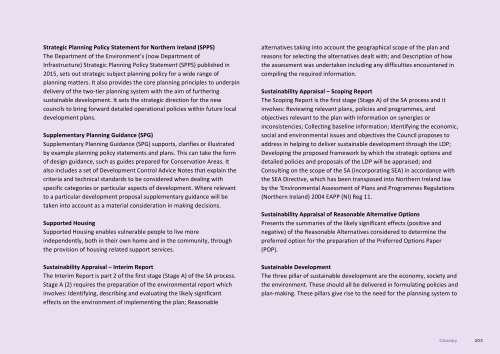Local Development Plan
2oBkyQa
2oBkyQa
Create successful ePaper yourself
Turn your PDF publications into a flip-book with our unique Google optimized e-Paper software.
Strategic <strong>Plan</strong>ning Policy Statement for Northern Ireland (SPPS)<br />
The Department of the Environment’s (now Department of<br />
Infrastructure) Strategic <strong>Plan</strong>ning Policy Statement (SPPS) published in<br />
2015, sets out strategic subject planning policy for a wide range of<br />
planning matters. It also provides the core planning principles to underpin<br />
delivery of the two-tier planning system with the aim of furthering<br />
sustainable development. It sets the strategic direction for the new<br />
councils to bring forward detailed operational policies within future local<br />
development plans.<br />
Supplementary <strong>Plan</strong>ning Guidance (SPG)<br />
Supplementary <strong>Plan</strong>ning Guidance (SPG) supports, clarifies or illustrated<br />
by example planning policy statements and plans. This can take the form<br />
of design guidance, such as guides prepared for Conservation Areas. It<br />
also includes a set of <strong>Development</strong> Control Advice Notes that explain the<br />
criteria and technical standards to be considered when dealing with<br />
specific categories or particular aspects of development. Where relevant<br />
to a particular development proposal supplementary guidance will be<br />
taken into account as a material consideration in making decisions.<br />
Supported Housing<br />
Supported Housing enables vulnerable people to live more<br />
independently, both in their own home and in the community, through<br />
the provision of housing related support services.<br />
Sustainability Appraisal – Interim Report<br />
The Interim Report is part 2 of the first stage (Stage A) of the SA process.<br />
Stage A (2) requires the preparation of the environmental report which<br />
involves: Identifying, describing and evaluating the likely significant<br />
effects on the environment of implementing the plan; Reasonable<br />
alternatives taking into account the geographical scope of the plan and<br />
reasons for selecting the alternatives dealt with; and Description of how<br />
the assessment was undertaken including any difficulties encountered in<br />
compiling the required information.<br />
Sustainability Appraisal – Scoping Report<br />
The Scoping Report is the first stage (Stage A) of the SA process and it<br />
involves: Reviewing relevant plans, policies and programmes, and<br />
objectives relevant to the plan with information on synergies or<br />
inconsistencies; Collecting baseline information; Identifying the economic,<br />
social and environmental issues and objectives the Council proposes to<br />
address in helping to deliver sustainable development through the LDP;<br />
Developing the proposed framework by which the strategic options and<br />
detailed policies and proposals of the LDP will be appraised; and<br />
Consulting on the scope of the SA (incorporating SEA) in accordance with<br />
the SEA Directive, which has been transposed into Northern Ireland law<br />
by the ‘Environmental Assessment of <strong>Plan</strong>s and Programmes Regulations<br />
(Northern Ireland) 2004 EAPP (NI) Reg 11.<br />
Sustainability Appraisal of Reasonable Alternative Options<br />
Presents the summaries of the likely significant effects (positive and<br />
negative) of the Reasonable Alternatives considered to determine the<br />
preferred option for the preparation of the Preferred Options Paper<br />
(POP).<br />
Sustainable <strong>Development</strong><br />
The three pillar of sustainable development are the economy, society and<br />
the environment. These should all be delivered in formulating policies and<br />
plan-making. These pillars give rise to the need for the planning system to<br />
Glossary 203


